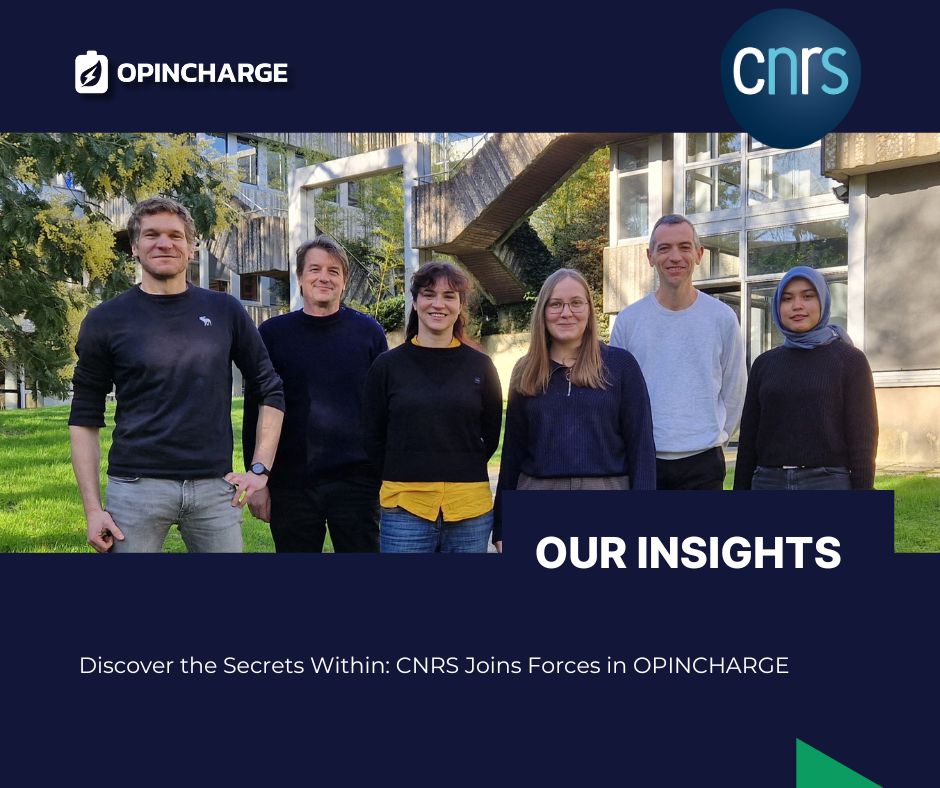Welcome to WordPress. This is your first post. Edit or delete it, then start writing!
Discover the Secrets Within: CNRS Joins Forces in OPINCHARGE
The OPINCHARGE project, a beacon of innovation in lithium-ion battery research, welcomes a key partner: the French National Centre for Scientific Research (CNRS). Renowned for its groundbreaking research across various disciplines, CNRS brings its expertise in high-precision characterization techniques to the forefront of the project.
CNRS: Sharpening the Focus on Battery Interfaces
CNRS scientists, experts in nanoscale characterization, play a vital role in Work Package 2, led by Ivan Lucas (IMN-CNRS). They wield powerful tools like enhanced Raman spectroscopy and aberration-corrected transmission electron microscopy to meticulously track and identify the formation of unwanted species during battery operation.
Beyond OPINCHARGE: Shaping the Future of Battery Research
CNRS’s contribution extends far beyond the OPINCHARGE project. Their involvement fosters a multi-pronged approach:
- Empowering the Next Generation
Three young researchers – two doctoral candidates and a postdoctoral researcher – will receive top-tier training to become future leaders in battery materials and device characterization. - Open Science for a Broader Impact
The advancements gleaned from OPINCHARGE will be openly shared with the scientific community. This will empower researchers to conduct precise, nanoscale analyses across a wider range of battery systems and chemistries in the future. - A Ripple Effect of Innovation
CNRS’s work encompasses synthesis, optimized imaging and spectroscopy experiments, device design, and advanced data processing. This multifaceted approach will undoubtedly impact numerous research fields beyond batteries.
Collaboration is the Key: A United Front for Battery Breakthroughs
CNRS recognizes the immense value of OPINCHARGE’s collaborative nature. They believe that by uniting a diverse group of experts, the project fosters a dynamic environment for tackling complex challenges at the nanoscale. Especially thanks to:
- Open Communication
Regular meetings, both in-person and online, will be instrumental in fostering discussions and ensuring each partner’s needs and contributions are effectively addressed. - Cross-Pollination of Ideas
Exchanging students and postdoctoral researchers will provide valuable opportunities for knowledge exchange, fostering a deeper understanding of each other’s work and leading to further advancements. - Synergy in Action
Collaboration is at the heart of OPINCHARGE’s success. This will be exemplified through joint cell design, co-authored publications, and other collaborative efforts.
Long-Term Vision: A Legacy of Discovery
CNRS hopes that the collaborative spirit fostered by OPINCHARGE will extend far beyond the project’s lifespan. It has got the ambition to lead to a chain reaction of new research and discoveries. They envision their contribution serving as a catalyst for the broader scientific community. It should enable a deeper understanding of battery reactivity at the nanoscale. Ultimately, CNRS aspires to play a part in Europe’s selection of the most promising battery materials for future development.
By incorporating CNRS’s expertise and unwavering commitment to collaboration, OPINCHARGE takes a significant leap forward in its quest to revolutionize lithium-ion battery technology.



